The show usually began with an audience member being called out and a large item of personal value being put in the crusher, such as a garden shed or a kebab trailer. In one episode, a man was asked to sing one of his favourite songs to stop his garden shed from being crushed. After he had sung the song, the shed was crushed anyway.
After the show opener, there would be a competition to find the "coolest" man in wherever that particular show was being held, such as Wood Green or Port Talbot. There would be three contestants who claimed to be the coolest man in their town; they would then go through a scientific "test" to find the coolest man. The men would be connected to heart monitors and a scary story would be told, during which Freddie would usually perform actions appropriate to the story, such as hitting one of the men over the head with a tray or making noises to simulate thunder and wind, pouring tomato ketchup over someone's head to simulate blood, or pouring ice down the back of someone to stimulate chills. The man with the lowest heart rate would be claimed the coolest man in the area and would receive a cloak and giant medallion.
Then, the 'Babies Win Prizes' contest would follow. The contest featured nine toddlers and one of their parents competing to win a toy car. Three heats would be held to narrow the number of toddlers and parents down to three; the toddlers would have to take part in certain challenges, such as:
- Snooker Loopy: The toddlers would have to throw as many custard pies as possible at their parents' faces. The toddler who threw the most would win the heat.
- Yeehaw: The toddlers would have to ride on their parents' backs and lasso cans off of several fences. The one who knocked off the most would win the heat.
- Joey the Clown: Using make up, the toddlers would have to make their parents look like a picture of a clown. The one who got the closest to the picture would win the heat.
The heats were followed by the 'Clash of the Clans' contest. This consisted of two families competing to win a giant trophy, usually manufactured by a nearby steelworks factory, in a talent contest. The round required the demonstration of various talents, such as dancing, singing, and stand-up comedy. There were three judges with buzzers; if all three buzzers were pressed, the contestant would have to leave the stage. The family who spent the most time on stage would win the trophy. The show would then return to the Babies Win Prizes semi-final.
The three winners of the heats would then compete in a semi-final. One of the semi-final challenges was called "Ready, Steady, Blaghh!". In this challenge the toddlers had to feed their parents freezing cold food (which the commentator joked that he had cooked himself). The two toddlers who fed their parents the most would get through to the final. The losers were given a goody bag and certificate.
Then, the final event, "Beat the Crusher", would begin. All the number plates in the car park outside the studio would be entered into a computer, two number plates would be selected at random, and the couple to whom the car belonged would have to play the game. While the couples prepared, the show returned to Babies Win Prizes for the final.
In the babies' final the two remaining toddlers would have to go through an obstacle course; the one who completed the course in the fastest time would win the toy car, and the runner-up would win a bike.
Then "Beat the Crusher" began. The two couples, now ready for the game, would have to answer multiple-choice general-knowledge questions. If a couple got a question wrong, their car would move up a level on a moving platform and closer to the crusher. If they got the question right, the opposing couple's car would move up a level. If they got a question wrong when they were above the crusher, known as the 'Danger Zone', or the opposing team got a question right, the loser's car was dropped into the crusher and destroyed. The owners received bus fare home as a consolation prize. The winning couple would then have a choice of two new cars, either a luxury estate car or a stylish four-door saloon.
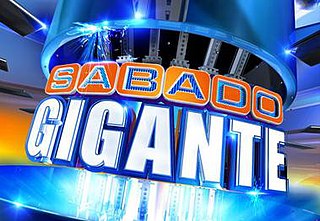
Sábado Gigante is a Spanish-language television program broadcast by Spanish International Network in the United States. It was also Univision's longest-running program and the longest-running television variety series in world television history. Sábado Gigante was an eclectic and frenetic mix of various contests, human-interest stories, and live entertainment. From its start in 1962, it was hosted by Chilean TV star Mario Kreutzberger under the stage name of Don Francisco. Rolando Barral and Pedro De Pool began serving as a co-hosts in 1986; that role was taken over by Javier Romero in 1991.
Family Fortunes is a British television game show based on the American game show Family Feud. The programme ran on ITV from 6 January 1980 to 30 December 2002. A celebrity version, All Star Family Fortunes, followed from 2006 to 2015. In 2020, the original version of the show returned after 18 years with Gino D'Acampo as host.

Beat the Clock is an American television game show that involves people trying to complete challenges to win prizes while faced with a time limit. The show was a creation of Mark Goodson-Bill Todman Productions.
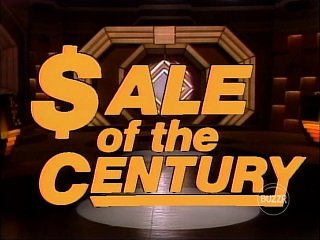
Sale of the Century is an American television game show that originally debuted on September 29, 1969, on NBC daytime. It was one of three NBC game shows to premiere on that date, the other two being the short-lived game shows Letters to Laugh-In and Name Droppers. The series aired until July 13, 1973, and a weekly syndicated series began that fall and ran for one season.

Beat the Teacher is a British children's game show that aired on BBC1 from 24 September 1984 to 27 October 1988. It was first hosted by Howard Stableford in 1984, then hosted by Paul Jones from 1985 to 1986 and finally Bruno Brookes from 1987 to 1988.
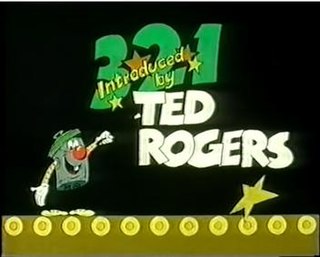
3–2–1 was a British game show that was made by Yorkshire Television for ITV. It ran for ten years, from 29 July 1978 to 24 December 1988, with Ted Rogers as the host.
Brain of Britain is a BBC radio general knowledge quiz, broadcast on BBC Radio 4.

Celebrity Squares is a British comedy game show based on the American comedy game show Hollywood Squares. It first ran from 20 July 1975 to 7 July 1979 and was hosted by Bob Monkhouse, then—also hosted by Monkhouse—from 8 January 1993 to 3 January 1997.
Going for Gold is a British television game show that originally aired on BBC1 between 12 October 1987 and 9 July 1996. It was revived for Channel 5 from 13 October 2008 to 20 March 2009.

Game Ka Na Ba?, formerly Pilipinas Game Ka Na Ba is a Philippine game show created by ABS-CBN. The main goal of the game is to win 2 million pesos by answering trivia questions.
It's Academic is an Australian children's game show which is based on the long-running American version of It's Academic, and pits students from different schools against each other in a test of knowledge covering a number of diverse subjects including English, mathematics, science, geography, sport, music and popular culture.
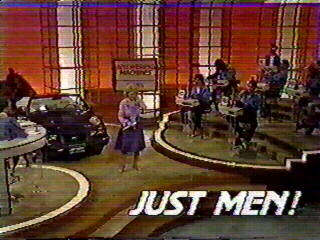
Just Men! is an American game show that aired on NBC Daytime from January 3 to April 1, 1983. The show starred Betty White, who won an Emmy award for her work on the show, with Steve Day announcing. It pitted two female contestants who were asked to predict answers to questions posed previously to a panel of seven male celebrities.

Miljoenenjacht, officially Postcode Loterij Miljoenenjacht, is a Dutch game show, sponsored by the country's postcode lottery, where a contestant and at-home viewer could win up to €5,000,000 or as little as €0.01. The show is broadcast at various times, spanning across six episodes for each set. The program was originally shown by TROS on NPO 2, but moved to creator John de Mol's channel Tien in 2005. After the channel was discontinued after its sale to the RTL Group, the program moved to RTL 4. In 2019, the program moved to SBS6 due to the transfer of Linda de Mol from RTL to SBS.
WinTuition is an American game show created as an original series for Game Show Network, on which it originally ran from December 9, 2002 to April 1, 2003. The game had a school-oriented theme in which three contestants competed to answer questions on general school-based subjects in an attempt to win a $50,000 college fund, hence the name of the show. The show was hosted by Marc Summers and announced by Burton Richardson. Henry Winkler served as the show's executive producer.
Sale of the Century is an Australian game show that aired on the Nine Network from 14 July 1980 to 29 November 2001. It is based on both Great Temptation that aired from 1970 to 1974 and on the original Sale that first aired in the United States from 1969 to 1973. The Australian format of Sale has since been used internationally, including in a revived US version that aired from 1983 to 1989.
PopMaster is a popular music radio quiz. Between February 1998 and March 2023, the quiz was part of the weekday morning Ken Bruce Show on BBC Radio 2. The questions were originally devised by radio producer and music collector Phil "The Collector" Swern, but are now written by Neil Myners and Simon Bray. On 17 January 2023, Bruce announced that he would be leaving Radio 2 in March, and would be joining Greatest Hits Radio, which announced that PopMaster would continue on his new show, starting on 3 April. The final edition of PopMaster on Radio 2 was broadcast on 3 March, Bruce's last show for the station.

Un, dos, tres... responda otra vez, usually shortened as Un, dos, tres..., and named Un, dos, tres... a leer esta vez in its last season, was a Spanish prime-time television game show, created by Narciso Ibáñez Serrador, which was broadcast on La Primera Cadena of Televisión Española for ten seasons from 1972 to 2004.

BrainSurge is an American children's game show that aired on Nickelodeon and was hosted by Jeff Sutphen. The show taped its first season in February 2009, and debuted on September 28, 2009. The show's format was adapted from the Japanese game show Brain Survivor. The U.S. version was created by Scott A. Stone, co-creator of Legends of the Hidden Temple, and Clay Newbill, executive producer of The Mole.

The Chase is a British television quiz show broadcast on ITV and hosted by Bradley Walsh. Contestants play against a professional quizzer, known as the "chaser", who attempts to prevent them from winning a cash prize.
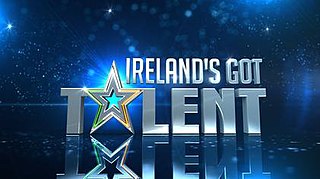
Ireland's Got Talent is the Irish version of the international Got Talent franchise. The series launched on 3 February 2018 on Virgin Media One and was hosted by Lucy Kennedy, accompanied by a sister show entitled Ireland's Got Mór Talent presented by Glenda Gilson and James Kavanagh.













